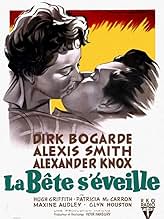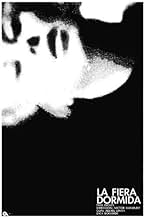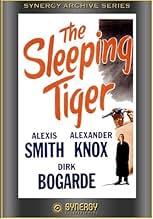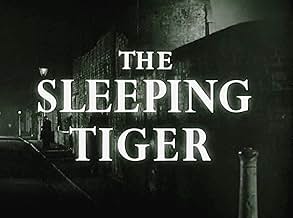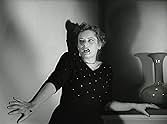CALIFICACIÓN DE IMDb
6.5/10
1.4 k
TU CALIFICACIÓN
Un convicto irrumpe en la casa de un psicoterapeuta. En lugar de ser arrestado, acepta someterse a una rehabilitación, pero la esposa del terapeuta se enamora de él.Un convicto irrumpe en la casa de un psicoterapeuta. En lugar de ser arrestado, acepta someterse a una rehabilitación, pero la esposa del terapeuta se enamora de él.Un convicto irrumpe en la casa de un psicoterapeuta. En lugar de ser arrestado, acepta someterse a una rehabilitación, pero la esposa del terapeuta se enamora de él.
- Dirección
- Guionistas
- Elenco
- Premios
- 1 nominación en total
Jimmy Charters
- Jazz Club Patron
- (sin créditos)
Martin Lyder
- Jazz Club Patron
- (sin créditos)
John Lynn
- Jazz Club Patron
- (sin créditos)
Ross Parker
- Barman
- (sin créditos)
Jim Tyson
- Jazz Club Patron
- (sin créditos)
Harry Van Engel
- Spectator at crash
- (sin créditos)
- Dirección
- Guionistas
- Todo el elenco y el equipo
- Producción, taquilla y más en IMDbPro
Opiniones destacadas
Dirk Bogarde attempts to mug Alexander Knox at gunpoint in a dark London street. Knox overcomes him by twisting his arm. Next, Alexis Smith, Knox's wife, comes home from a trip to Paris, sees Bogarde in her house, assumes he is one of her psychiatrist husband's patients, but is told that he is a criminal who is living under her roof for six months as an experiment in criminal rehabilitation which her husband is carrying out as a humane alternative to sending the young man to jail. She accepts the arrangement with barely a shrug. Bogarde immediately proceeds to verbally and physically abuse the house maid and act rudely toward Smith. Yet for some reason she is attracted to him and soon they are having a hot affair under the husband's nose. And on and on it goes. One startling development after another. There are elements of the overly simplistic psychiatric rehab genre reminiscent of Hollywood classics like Now, Voyager and Spellbound but with a more realistic look and feel. The music is intense and draws attention to itself, from the cacophonous noise that Smith listens to on her home record player to the sizzling live jazz at the Soho dive where she goes to loosen up with her secret lover. Bogarde is supposed to be a low-life criminal but his polished accent and genteel mannerisms seem thoroughly middle-class and this is never explained. Alexander Knox seems made of wood yet is somehow believable as the kind of intellectually preoccupied and unflappable person who just might come up with the idea of inviting a mugger into his home as an eccentric form of research. And Smith, icily self-contained at the beginning, gradually gets a chance to do some dynamic emoting. She's very good in this. The title of the film symbolizes the wild impulses that sleep within us, waiting to be awakened. From the 2007 vantage point there are no important or original social or intellectual insights here but the way the film is edited, photographed and scored are deliberately jarring without distracting from the film's intent. Losey wants to shake us up and he succeeds.
At the time ,like so many others such as Dalton Trumbo,Joseph Losey used to work under pseudos because of his commie friends.
"The sleeping tiger" predates permanent features in the director's work:
-the intruder ,be it a servant "(eponymous movie) ,a licentious gypsy ("the gypsy and the gentleman" ),some kind of doppelganger ("Monsieur Klein" ,perhaps his masterpiece), a mysterious girl ("secret ceremony"),who makes the place his very own ,physically ("The servant" ) or mentally ('Monsieur Klein" ).Dirk Bogarde is fascinating in his part of a young offender :his acting is so subtle we do not know when the movie ends whether he is a victim or a perverse person,probably both.
-the depiction of the decay of a milieu the intruder will destroy : the old aristocracy in "the gypsy and the gentleman" ,the bourgeoisie in "the servant" the world of the war profiteers in " Monsieur Klein" . When Alexis Smith tells her husband's guinea pig that she got a raw deal too when she was a child but she made her way of life just the same ,the guy knows better :"because you think you are happy now?"
A shrink wants to study a case of delinquency and wakens the sleeping tiger...which is perhaps not the one you are thinking of.
Superlative performances by the three leads.
"The sleeping tiger" predates permanent features in the director's work:
-the intruder ,be it a servant "(eponymous movie) ,a licentious gypsy ("the gypsy and the gentleman" ),some kind of doppelganger ("Monsieur Klein" ,perhaps his masterpiece), a mysterious girl ("secret ceremony"),who makes the place his very own ,physically ("The servant" ) or mentally ('Monsieur Klein" ).Dirk Bogarde is fascinating in his part of a young offender :his acting is so subtle we do not know when the movie ends whether he is a victim or a perverse person,probably both.
-the depiction of the decay of a milieu the intruder will destroy : the old aristocracy in "the gypsy and the gentleman" ,the bourgeoisie in "the servant" the world of the war profiteers in " Monsieur Klein" . When Alexis Smith tells her husband's guinea pig that she got a raw deal too when she was a child but she made her way of life just the same ,the guy knows better :"because you think you are happy now?"
A shrink wants to study a case of delinquency and wakens the sleeping tiger...which is perhaps not the one you are thinking of.
Superlative performances by the three leads.
An overdone psychodrama whose twists and turns require some unfortunate stretches.
Too bad the plot ironies finally drown in a tidal wave of over-emotion. Apparently, ace director Losey couldn't tone down Smith's carpet chewing finale that unfortunately overwhelms what's gone before. At the same time, we're hit over the head with the finale's sleeping tiger irony. I think the audience can put two and two together without that billboard contrivance.
Seems Glenda (Smith) is the highly repressed wife of coldly intellectual Dr. Clive (Knox), who's been neglecting her emotional needs as he pursues his writing and research. In that same pursuit he takes proven felon Frank (Bogarde) into his household in order to test his theory of criminal reform. Clive's main reform tool is to excuse Frank's misbehavior whether criminal or moral in order to get at the causes of Frank's disordered psyche. Needless to say, such indulgences cause all kinds of problems, both inside the household and out.
As Doc's indulgences mount, it seems that an optimistic ideal is being mocked. Namely, that there are no bad people, only mistreated kids who then grow into criminal behavior. For example, while in the Doc's "care", Frank robs a jewelry store, and maybe worse, spits on Clive's generosity by seducing wife Glenda. In return, the Doc simply ignores the mounting transgressions. To me, that willingness, which also puts people in Doc's community in danger, looks like a mockery of a liberal brand of Freudianism then in vogue. It may be a provocative idea for the film to play with. Nonetheless, the tiger upshot undercuts that optimism, at the same time it clouds the film's one very real tragedy.
Anyway, Bogarde comes through with a nicely modulated turn, while Knox deadpans through thick and thin, even as Smith does the sleeping tiger to an ear-splitting roar. Apparently the movie was filmed more cheaply abroad at a time when TV was eating into movie profits. So, on a small budget, don't expect much in terms of scenery or action, though noir master Losey does work in some atmosphere. To me, the story's highlight and genuine tragedy is downplayed, but is present nevertheless if you think about it. As the 90-minutes stands, it's something of a disappointment given the talent involved.
(In passing-depending on the camera angle there are times when it appears Frank and Glenda resemble Lucy and Desi from TV's iconic I Love Lucy. Then again, maybe I had one too many beers!)
Too bad the plot ironies finally drown in a tidal wave of over-emotion. Apparently, ace director Losey couldn't tone down Smith's carpet chewing finale that unfortunately overwhelms what's gone before. At the same time, we're hit over the head with the finale's sleeping tiger irony. I think the audience can put two and two together without that billboard contrivance.
Seems Glenda (Smith) is the highly repressed wife of coldly intellectual Dr. Clive (Knox), who's been neglecting her emotional needs as he pursues his writing and research. In that same pursuit he takes proven felon Frank (Bogarde) into his household in order to test his theory of criminal reform. Clive's main reform tool is to excuse Frank's misbehavior whether criminal or moral in order to get at the causes of Frank's disordered psyche. Needless to say, such indulgences cause all kinds of problems, both inside the household and out.
As Doc's indulgences mount, it seems that an optimistic ideal is being mocked. Namely, that there are no bad people, only mistreated kids who then grow into criminal behavior. For example, while in the Doc's "care", Frank robs a jewelry store, and maybe worse, spits on Clive's generosity by seducing wife Glenda. In return, the Doc simply ignores the mounting transgressions. To me, that willingness, which also puts people in Doc's community in danger, looks like a mockery of a liberal brand of Freudianism then in vogue. It may be a provocative idea for the film to play with. Nonetheless, the tiger upshot undercuts that optimism, at the same time it clouds the film's one very real tragedy.
Anyway, Bogarde comes through with a nicely modulated turn, while Knox deadpans through thick and thin, even as Smith does the sleeping tiger to an ear-splitting roar. Apparently the movie was filmed more cheaply abroad at a time when TV was eating into movie profits. So, on a small budget, don't expect much in terms of scenery or action, though noir master Losey does work in some atmosphere. To me, the story's highlight and genuine tragedy is downplayed, but is present nevertheless if you think about it. As the 90-minutes stands, it's something of a disappointment given the talent involved.
(In passing-depending on the camera angle there are times when it appears Frank and Glenda resemble Lucy and Desi from TV's iconic I Love Lucy. Then again, maybe I had one too many beers!)
The Sleeping Tiger is directed by Joseph Losey (using the alias Victor Hanbury) and adapted to screenplay by Derek Frye from the novel written by Maurice Moiseiwitswch. It stars Dirk Bogarde, Alexis Smith, Alexander Knox, Patricia McCarron, Maxine Audley and Hugh Griffith. Music is by Malcolm Arnold and cinematography by Harry Waxman.
When criminal Frank Clemmons (Bogarde) fails in his attempt to mug psychiatrist Dr. Clive Esmond (Knox), he is surprised to be invited to stay at the good doctor's house instead of going to prison. The doctor's motives are simple, he believes he can reform Frank whilst studying him at close quarters. Frank is only too happy to accept the offer, even more so when a relationship begins to form with Dr. Esmond's wife, Glenda (Smith). However, as passions stir and the tiger awakens, it's unlikely to end happily...
Blacklisted in Hollywood, Joseph Losey would find a home in the UK and produce some superb movies. The Sleeping Tiger has thematic links to two other great Losey movies, The Prowler (1951) and The Servant (1963), a sort of meat in the sandwich if you will. Dripping with psychologically redemptive sweat and pulsing with sexual frustrations, it's a film very much concerned with tightening the spring until it eventually explodes. And when it does it's well worth the wait, for there is no pandering to happy days endings, this has a kicker of a twist and it beats a black heart.
In the interim some patience is required as the key relationships at the centre of the plotting are steadily drawn, with Losey and Frye tantalising us with shards of character interest at regular intervals. Frank drifting on and off the rails livens proceedings, with the good doctor Esmond's loyalty putting some surprising spice in the story, while Frank's courting of Glenda (horse rides together, taking her dancing at a seedy jazz/blues club) and bullying of the maid, Sally (McCarron), keep us fascinated as to where this will end up.
Visually it's firmly in noir territory, more so in the first and last thirds, where Waxman (Brighton Rock) ensures shadows reflect the tonal shifts of plotting and the character's mental health. Arnold's (Academy Award Winner for The Bridge on the River Kwai) score is heavily jazz and blues influenced, mixing sorrowful beats with up-tempo thrums. Cast are excellent. Bogarde and Losey would compliment each other greatly and this is a good indicator of what would come during their five collaborations. Knox (Chase A Crooked Shadow) is wonderfully assured, while Smith (The Two Mrs. Carrolls) owns the movie with some deft changing of character gears.
The plot's a bit out there man, and Losey's slow teasing in the mid- sections may annoy those not familiar with his non American work. But this is very much a little ole devil worth seeking out. 7.5/10
When criminal Frank Clemmons (Bogarde) fails in his attempt to mug psychiatrist Dr. Clive Esmond (Knox), he is surprised to be invited to stay at the good doctor's house instead of going to prison. The doctor's motives are simple, he believes he can reform Frank whilst studying him at close quarters. Frank is only too happy to accept the offer, even more so when a relationship begins to form with Dr. Esmond's wife, Glenda (Smith). However, as passions stir and the tiger awakens, it's unlikely to end happily...
Blacklisted in Hollywood, Joseph Losey would find a home in the UK and produce some superb movies. The Sleeping Tiger has thematic links to two other great Losey movies, The Prowler (1951) and The Servant (1963), a sort of meat in the sandwich if you will. Dripping with psychologically redemptive sweat and pulsing with sexual frustrations, it's a film very much concerned with tightening the spring until it eventually explodes. And when it does it's well worth the wait, for there is no pandering to happy days endings, this has a kicker of a twist and it beats a black heart.
In the interim some patience is required as the key relationships at the centre of the plotting are steadily drawn, with Losey and Frye tantalising us with shards of character interest at regular intervals. Frank drifting on and off the rails livens proceedings, with the good doctor Esmond's loyalty putting some surprising spice in the story, while Frank's courting of Glenda (horse rides together, taking her dancing at a seedy jazz/blues club) and bullying of the maid, Sally (McCarron), keep us fascinated as to where this will end up.
Visually it's firmly in noir territory, more so in the first and last thirds, where Waxman (Brighton Rock) ensures shadows reflect the tonal shifts of plotting and the character's mental health. Arnold's (Academy Award Winner for The Bridge on the River Kwai) score is heavily jazz and blues influenced, mixing sorrowful beats with up-tempo thrums. Cast are excellent. Bogarde and Losey would compliment each other greatly and this is a good indicator of what would come during their five collaborations. Knox (Chase A Crooked Shadow) is wonderfully assured, while Smith (The Two Mrs. Carrolls) owns the movie with some deft changing of character gears.
The plot's a bit out there man, and Losey's slow teasing in the mid- sections may annoy those not familiar with his non American work. But this is very much a little ole devil worth seeking out. 7.5/10
A certain Victor Hanbury is credited with directing this remarkable psychological drama but that won't fool any of Joseph Losey's admirers since it shares not only thematic similarities with one of his most notable American films, THE PROWLER (1951), but was indeed the turning point of his career in many ways: blacklisted by Hollywood for his Communist leanings, Losey fled first to Italy and then to Britain, remaining in Europe for the rest of his days. THE SLEEPING TIGER also marked the start of a fruitful collaboration (resulting in five films) between Losey and star Dirk Bogarde, who here shows a definite maturity miles away from the bland matinée idol roles he typically played during this period; the film itself has an intensity not found in contemporary British cinema.
Alexis Smith (terrific in one of her last starring roles) and Alexander Knox (playing his part in the Glenn Ford manner – where a quiet exterior conceals a strong personality, hence the film's title) are the married couple whose sheltered suburban lives are invaded by smart but incorrigible thug Bogarde; Knox is a psychiatrist whom the young man had tried to hold up, but has the tables turned on him and is subsequently kept on in the former's house as a 'guinea pig' – echoes of BLIND ALLEY (1939) and THE DARK PAST (1948) – where he stirs up the passionate instincts of the doctor's frustrated American wife. Needless to say, there's no happy ending for any of the characters: the climax provides plenty of fireworks and twists – with Losey's ironic symbolism being maintained till the film's very last shot. Composer Malcolm Arnold adapts his score to each of the film's moods, alternating between the sleazy and the histrionic.
Unfortunately, the poor-quality Public Domain print I watched bears some evident signs of wear-and-tear as there are a handful of jarring jump-cuts throughout (resulting in a running-time of 87 minutes against the official 89); several years back, the film was released on PAL VHS but no official DVD is in sight yet in any region (a status, alas, in common with the majority of Losey's work prior to the 1960s).
Alexis Smith (terrific in one of her last starring roles) and Alexander Knox (playing his part in the Glenn Ford manner – where a quiet exterior conceals a strong personality, hence the film's title) are the married couple whose sheltered suburban lives are invaded by smart but incorrigible thug Bogarde; Knox is a psychiatrist whom the young man had tried to hold up, but has the tables turned on him and is subsequently kept on in the former's house as a 'guinea pig' – echoes of BLIND ALLEY (1939) and THE DARK PAST (1948) – where he stirs up the passionate instincts of the doctor's frustrated American wife. Needless to say, there's no happy ending for any of the characters: the climax provides plenty of fireworks and twists – with Losey's ironic symbolism being maintained till the film's very last shot. Composer Malcolm Arnold adapts his score to each of the film's moods, alternating between the sleazy and the histrionic.
Unfortunately, the poor-quality Public Domain print I watched bears some evident signs of wear-and-tear as there are a handful of jarring jump-cuts throughout (resulting in a running-time of 87 minutes against the official 89); several years back, the film was released on PAL VHS but no official DVD is in sight yet in any region (a status, alas, in common with the majority of Losey's work prior to the 1960s).
¿Sabías que…?
- TriviaWhen this movie first appeared, the direction was credited to Victor Hanbury, a real-life Producer, who only agreed to take the credit when the actual Director, the blacklisted Joseph Losey, insisted that this would be a great help to him, as he needed the work. Although several versions of this movie, including the DVD, still credit Hanbury, there are prints where Losey is credited under his own name. The first several times it was shown on British television, in the late 1960s and early 1970s, Losey had the credit.
- ErroresAngry that Frank has left her Glenda wearing a black dress runs from the house, jumps in her car and drives off. Spotting Frank (Dirk Bogarde) walking along the road she stops and picks him up but she's now wearing a coat.
- Citas
Glenda Esmond: You're not going to give me notice, like a servant or a waitress!
- ConexionesFeatured in Joseph Losey: The Man with Four Names (1998)
Selecciones populares
Inicia sesión para calificar y agrega a la lista de videos para obtener recomendaciones personalizadas
- How long is The Sleeping Tiger?Con tecnología de Alexa
Detalles
- Fecha de lanzamiento
- Países de origen
- Idioma
- También se conoce como
- Der schlafende Tiger
- Locaciones de filmación
- William Mansell, 24 Connaught Street, Londres, Inglaterra, Reino Unido(Smash & Grab 27 minutes from start)
- Productoras
- Ver más créditos de la compañía en IMDbPro
- Tiempo de ejecución1 hora 29 minutos
- Color
- Relación de aspecto
- 1.37 : 1
Contribuir a esta página
Sugiere una edición o agrega el contenido que falta

Principales brechas de datos
By what name was The Sleeping Tiger (1954) officially released in India in English?
Responda
